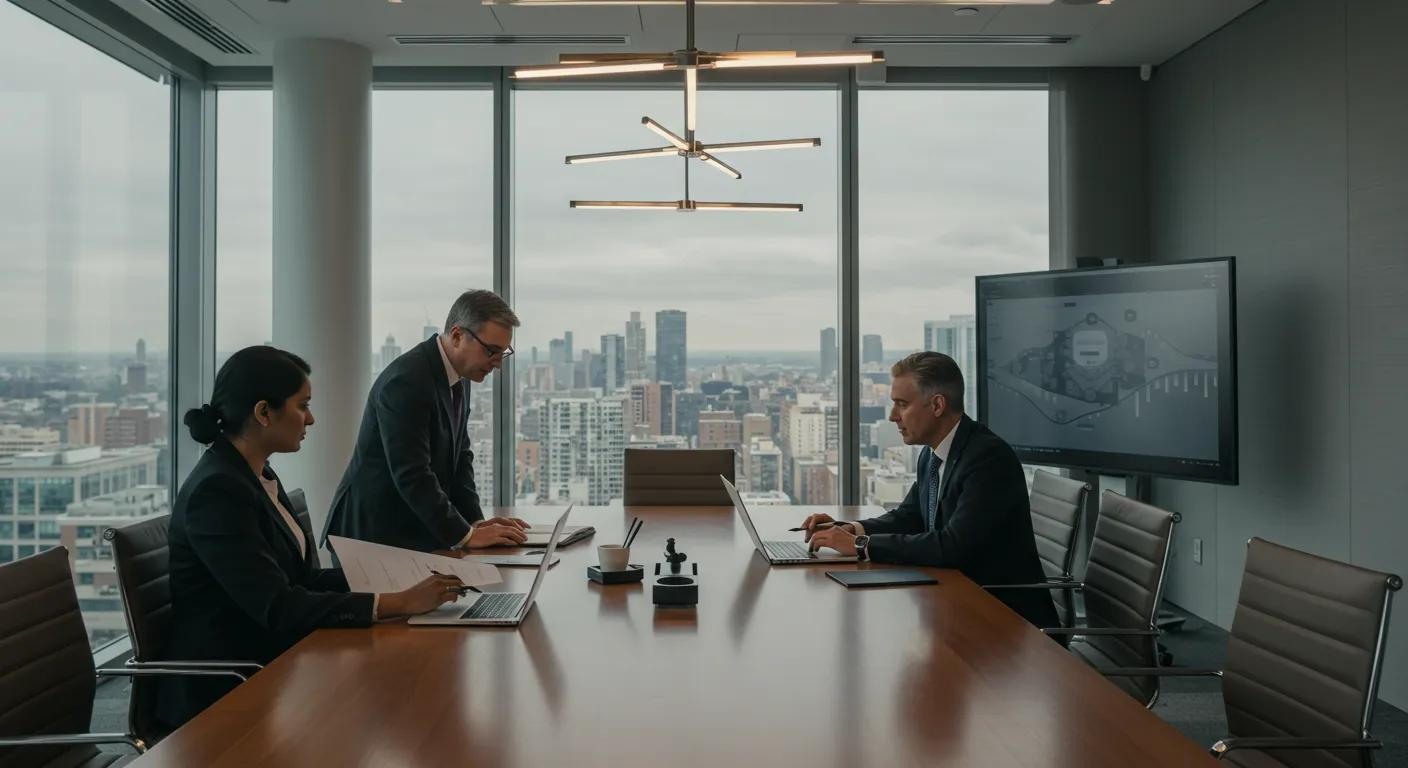
03 Nov Why Choose Commercial Property Lawyers Covering Shoreditch? RHJ Devonshire’s Approach
Commercial property law governs the rights and obligations that arise when businesses occupy, buy or sell non-residential premises, and clear legal advice minimises commercial risk while enabling strategic use of space. This guide explains what commercial property law covers, why Shoreditch’s fast-changing market creates particular legal demands, and how practical, commercially minded legal counsel supports landlords, tenants and investors. You will learn the core statutory and contractual issues—leases, rent review, assignments, planning and conveyancing—alongside practical steps for transactions and dispute resolution. We then show how RHJ Devonshire Solicitors delivers bespoke, locally informed commercial property services near Shoreditch, focusing on transparent process, pragmatic outcomes and client-focused communication. Read on for clear, actionable guidance on selecting a Shoreditch commercial property solicitor, the typical conveyancing timeline, how we approach fees, and how to prepare for an effective legal consultation.
What Is Commercial Property Law and Why Is It Important for Shoreditch Businesses?
Commercial property law defines legal relationships between landlords, tenants, buyers and sellers of non-residential property, and it governs transactions, leases, disputes and development activity that underpin business operations. The mechanism by which this area of law protects commercial interests is contractual clarity and statutory compliance, which together reduce transactional risk and enable businesses to negotiate flexible terms that align with commercial goals. For Shoreditch businesses—where mixed-use development, pop-up retail and evolving flexible workspace models are common—sound legal advice converts market complexity into manageable contractual outcomes. Understanding these legal fundamentals helps businesses protect trading space, manage liabilities for service charges and dilapidations, and unlock development or assignment options when growth or change is needed.
What Are the Key Legal Aspects of Commercial Property in Shoreditch?
Commercial property matters centre on a predictable set of legal aspects that directly affect occupiers and owners: lease terms, rent review mechanisms, assignment and subletting rules, service charges, repair obligations and planning consents. Each element functions to allocate risk: lease clauses set duration and break provisions, rent review clauses determine future costs, and service charge regimes allocate operational expenses. Due diligence and title checks identify restrictive covenants, third-party rights and title defects that can derail a deal if unaddressed, while planning and change-of-use rules determine whether a premises can support a proposed business use. Knowing these components enables commercial parties to negotiate protective clauses, schedule contingencies and estimate long-term occupancy costs.
- The key legal aspects include lease negotiation, due diligence, planning permissions and dispute handling.
- Parties can mitigate risk through bespoke lease clauses, pre-contract enquiries and tailored safeguards.
- Prioritising early legal review reduces transaction delays and limits unexpected liabilities.
This list clarifies foundational risks; the next section explains how Shoreditch’s market characteristics change legal priorities and drafting choices.
How Does Shoreditch’s Commercial Property Market Impact Legal Services?

Shoreditch’s commercial property market is characterised by rapid change, creative mixed-use projects and strong demand for short-term, flexible lease solutions, and these features shape legal priorities for both landlords and tenants. Flexibility is often negotiated through break clauses, rolling terms or license arrangements to accommodate pop-up retailers and evolving office models, while investors and developers require precise planning advice for mixed-use schemes and consent strategy. ESG and “green lease” considerations increasingly influence lease drafting, with clauses addressing energy performance, sustainability obligations and collaborative repair regimes becoming more common. Legal advisers therefore prioritise scalable lease drafting, proactive planning, analysis and negotiation strategies that reflect the short-term agility many Shoreditch occupiers require.
- Shoreditch market drivers: flexible workspace demand, retail/hospitality churn, and mixed-use redevelopment.
- Legal responses: flexible break options, tailored rent review mechanisms, and planning foresight.
- Advisers who monitor local trends add value by aligning legal terms with operational realities.
Understanding market-driven legal priorities leads naturally to identifying which property types dominate Shoreditch and the specific legal considerations each raises.
What Types of Commercial Properties Are Common in Shoreditch?
Shoreditch hosts a mix of offices, co-working spaces, retail and hospitality premises, light industrial and mixed-use developments, each bringing discrete legal considerations that affect transactions and occupation. Offices and co-working spaces focus on service charge allocation, landlord repair obligations and lease length that supports business growth, whereas retail and hospitality operators need attention to licensing, extraction and planning consents as well as assignment restrictions. Mixed-use developments combine residential overlays and commercial rights, requiring careful drafting of shared-access arrangements, management company obligations and covenant management. Light industrial and studio spaces may raise issues around permitted use, noise and planning restrictions that must be checked at the due diligence stage.
- Office/co-working: service charges, repair obligations and flexible term options.
- Retail/hospitality: licensing, planning, ventilation and assignment constraints.
- Mixed-use: shared facilities governance, management company duties and restrictive covenants.
Recognising property-specific risks ensures targeted legal checks during negotiations and due diligence, and the next section outlines how RHJ Devonshire applies bespoke services in Shoreditch to address these issues.
How Does RHJ Devonshire Provide Bespoke Commercial Property Legal Services in Shoreditch?

RHJ Devonshire Solicitors combines commercially minded legal counsel with local knowledge to tailor services for Shoreditch clients, focusing on pragmatic contracts, clear timelines and responsive communication. The firm’s approach begins with diagnosing client objectives—such as minimising occupation costs, securing flexible break options or facilitating sale—and then designing legal steps that align with commercial strategy. Deliverables typically include tailored lease negotiations, thorough due diligence for purchases and sales, dispute avoidance and resolution pathways, and practical post-completion support to manage dilapidations or handback obligations. Local accessibility and specialist teams allow the firm to coordinate with surveyors, agents and planning consultants to keep transactions on track.
What Is RHJ Devonshire’s Tailored Approach to Commercial Lease Agreements?
RHJ Devonshire’s lease work focuses on identifying commercial risk early, negotiating protective clauses and drafting clear, enforceable agreements that reflect business needs. The process starts with a practical risk assessment—highlighting rent review exposure, unwanted assignment restrictions or onerous repairing obligations—and then prioritises negotiation points that deliver immediate commercial value. Where appropriate, the team drafts break clauses, rent caps or staged obligations that give businesses operational flexibility, and it ensures service charge schedules and Schedules of Condition accurately reflect landlord and tenant responsibilities.
How Does RHJ Devonshire Support Commercial Property Purchases and Sales?
For purchases and sales, RHJ Devonshire offers structured conveyancing designed for commercial complexity: pre-contract due diligence, drafting and negotiating sale documents, and managing exchange and completion logistics. The conveyancing sequence identifies title defects, restrictive covenants, and third-party rights early and coordinates with surveyors and lenders to resolve issues before exchange, reducing delay risk. Post-completion tasks—such as Land Registry submissions and transitional service charge apportionment—are managed to limit client administrative burden. The solicitor’s advisory role includes explaining the commercial implications of the protections and agreements within your contract to ensure informed decision-making at each milestone.
How Are Commercial Property Disputes Resolved by RHJ Devonshire?
Dispute resolution balances commercial outcomes with cost-efficient processes, using negotiation and mediation to preserve business relationships and reserving litigation for necessary enforcement. Disputes commonly involve rent arrears, breach of covenant or dilapidations claims, and a staged strategy helps secure practical settlements without escalating costs. RHJ Devonshire assesses commercial risk, proposes targeted settlement terms and supports clients through mediation, arbitration or court action depending on the dispute’s nature. Emphasising commercial pragmatism, the firm prioritises remedies that enable clients to continue trading while resolving legal exposure.
This business-focused section explains service scope; the following part argues why local expertise is essential for Shoreditch clients and how proximity and market knowledge deliver practical benefit.
Why Is Local Expertise Crucial When Choosing Commercial Property Lawyers in Shoreditch?
Local expertise translates legal knowledge into practical advantage because understanding Shoreditch’s planning culture, agent practices and common lease formats shortens negotiation cycles and improves outcomes. Lawyers who know local market norms can spot atypical lease clauses, anticipate landlord negotiation strategies and advise on bespoke solutions for flexible workspace or hospitality uses. Proximity to clients and local stakeholders—agents, surveyors, planning officers and the Land Registry—also speeds meeting scheduling, document signing and service of notices, which matters when commercial timelines are tight. Ultimately, local knowledge reduces friction across transactions and aligns legal solutions with the commercial realities of Shoreditch.
How Does RHJ Devonshire’s Shoreditch Location Benefit Clients?
RHJ Devonshire’s office near Liverpool Street means practical access to central London transport links and easier in-person engagement for Shoreditch clients who prefer face-to-face meetings or need attendance at local hearings. Being nearby facilitates rapid coordination with surveyors, agents and the Land Registry when time-sensitive actions are required, such as completion logistics or urgent dispute filings. The firm’s local presence supports an effective client journey from instruction to completion and allows solicitors to maintain frequent, clarifying contact with stakeholders. For clients whose operations depend on quick property decisions, proximity is a measurable advantage.
- Proximity speeds meetings and stakeholder coordination.
- Local attendance reduces completion delay risk.
- In-person access supports complex negotiations and hearings.
These benefits underscore why local presence matters; the next subsection outlines the planning and regulatory challenges unique to Shoreditch.
What Are the Unique Planning and Regulatory Challenges in Shoreditch?
Shoreditch faces planning issues typical of a creative, mixed-use area: conservation area restrictions, tight change-of-use controls, and the need for coordinated approvals on mixed-use schemes that blend residential and commercial components. Conservation area rules can limit external alterations and require heritage-sensitive design, while permitted development rights and Article 4 directions may restrict straightforward change of use from office to residential or retail. Environmental and licensing requirements are particularly relevant for hospitality uses, where extraction and opening hours impact planning and licensing outcomes. Lawyers familiar with these constraints help clients craft proposals and lease terms that anticipate regulatory requirements, reducing the risk of post-completion enforcement.
How Does RHJ Devonshire Stay Updated on Shoreditch Market Trends?
Maintaining current market insight involves monitoring planning decisions, local authority consultations and market reports, and feeding those insights into client advice to keep leases and transaction strategies relevant. Regular review cycles and local networks enable the firm to align legal recommendations with evolving Shoreditch trends—such as increased demand for short-term flexible leases or sustainability clauses in contracts. This ongoing awareness informs negotiation positions, due diligence checklists and recommended covenant structures that reflect the present market. By translating trend data into practical legal steps, advisers enable clients to take commercially sound positions in transactions.
Understanding local dynamics sets the stage for describing the firm’s practical, commercially minded legal advice model and the technologies that support client service.
What Makes RHJ Devonshire’s Commercial Property Legal Advice Commercially Minded and Practical?
Commercially minded legal advice prioritises business outcomes by balancing legal protection with operational flexibility, ensuring agreements enable clients to execute their plans rather than impede them. Mechanically, this means translating legal risk into commercial trade-offs—such as accepting limited repair obligations in return for lower rent or negotiating conditional break rights to support uncertain growth. Practical counsel also includes drafting clauses that minimise ambiguity (reducing future disputes), proposing staged obligations that mirror business milestones and recommending dispute resolution clauses that preserve trading relationships. The objective is to make law an enabler of strategy rather than an obstacle.
How Does RHJ Devonshire Balance Legal Precision with Business Realities?
Balancing precision with pragmatism involves prioritising clauses that materially affect commercial outcomes—rent reviews, break options and assignment freedoms—while using concise, enforceable language to avoid misinterpretation. Counsel will identify non-essential legal positions to concede in exchange for more valuable protections, thereby aligning legal investment and negotiation effort with client priorities. This approach delivers agreements that protect balance-sheet exposure but allow operational agility, with legal drafting calibrated to the client’s commercial timetable. Translating legal detail into clear operational consequences is central to commercially focused practice.
What Innovative Technologies Does RHJ Devonshire Use to Enhance Client Service?
The use of secure document management, e-signature capability and client portals speeds transactions, improves transparency and reduces administrative delays, enabling clients to review and approve documents efficiently. Technology also supports coordinated due diligence, with centralised tracking of title checks, planning searches and correspondence that reduces the risk of missed items. Remote consultation tools facilitate rapid advice and decision-making without sacrificing thoroughness, making it easier for busy commercial clients to stay engaged. These systems together shorten timelines and provide audit trails that enhance client confidence in the process.
How Does RHJ Devonshire Ensure Quality and Practicality in Legal Guidance?
Quality assurance rests on specialist teams, peer review of key documents and client feedback loops that refine processes, ensuring advice is accurate and practically applicable. Specialist commercial property lawyers focus on relevant sub-areas—leases, conveyancing, disputes—so clients benefit from deep subject-matter knowledge rather than generalist input. Internal protocols for draft review, checklist use and project management support consistent delivery and predictable milestones for clients. This layered approach keeps work aligned to client goals while maintaining high legal standards.
These service design choices lead to how the firm discusses fees and communicates timelines to clients seeking transparent, client-focused engagement.
How Transparent and Client-Focused Is RHJ Devonshire’s Commercial Property Service?
Transparency in commercial property work means clear explanations of fee structures, a predictable process with defined milestones and regular communication on progress and potential issues. Common fee structures in the market include fixed fees for scoped tasks, hourly billing for open-ended matters and hybrid arrangements for complex transactions; the chosen model typically reflects transaction complexity, required due diligence and negotiation intensity. RHJ Devonshire aims to set expectations early—outlining likely factors influencing your investment, anticipated milestones and potential contingency points—so clients can plan commercially and avoid surprises. A transparent process also includes clear guidance on typical conveyancing durations and the actions needed from clients to maintain momentum.
What Are the Typical Investment and Fee Structures for Commercial Property Legal Services?
Your investment depends on task complexity: straightforward document drafting can often be scoped with a clear fee, while negotiation-heavy leases or purchases with title issues are typically structured based on time or a hybrid approach. Factors influencing your investment include title complexity, the level of negotiation required, mortgage or lender involvement, and the need for specialist third-party reports. Clear scoping of work, staged fee estimates, and regular updates help you manage your budget and align your legal investment with commercial priorities. Open communication about these drivers supports informed decisions on whether to pursue faster or more thorough routes in a given matter.
- Fixed fees suit well-defined tasks and provide budget certainty.
- Hourly billing is appropriate for unpredictable negotiations or disputes.
- Hybrid models combine predictability with flexibility for unforeseen issues.
These models help clients choose the best commercial fit; the next section explains how RHJ Devonshire guides clients through commercial conveyancing stages.
How Does RHJ Devonshire Guide Clients Through the Commercial Conveyancing Process?
The commercial conveyancing lifecycle begins with pre-contract due diligence—title checks, planning and environmental enquiries—and moves to contract drafting, exchange and completion coordination, followed by post-completion registration and apportionment tasks. RHJ Devonshire manages each milestone with clear responsibilities, timelines and expected client inputs, coordinating surveyors, lenders and tax advisors where needed. Typical durations vary, but a focused transaction with a clear title may complete in a few months, while complex acquisitions with planning or title issues take longer; proactive issue-spotting and early resolution are the principal methods to shorten timelines. Regular status updates and milestone checklists keep clients informed and able to make timely decisions.
What Client Testimonials and Case Studies Highlight RHJ Devonshire’s Success?
Publicly available testimonials and anonymised case studies demonstrate how practical legal strategies and local market knowledge produce favourable commercial outcomes, and prospective clients are encouraged to request relevant examples during initial enquiries. Where case studies exist, they typically illustrate problem identification, negotiated solutions and the commercial impact—such as securing flexible terms or resolving dilapidations without prolonged litigation. If specific examples are needed, clients can ask the firm for anonymised case summaries that match their scenario to understand likely pathways and outcomes. Sharing these precedents helps prospective clients gauge approach, responsiveness and likely commercial results.
What Are Common Questions About Commercial Property Law in Shoreditch?
Prospective clients often ask straightforward questions about leases, timelines and how to choose a solicitor; concise answers help capture intent and provide fast guidance. Clear, short answers reduce confusion and are useful for quick decision-making about instructing counsel or preparing for transactions. The following Q&A addresses the most frequent queries with direct, practical responses.
What Is a Commercial Lease and Why Is It Important?
A commercial lease is a legally binding agreement that grants occupation rights of non-residential property in exchange for rent and obligations defined by the lease, and it matters because it sets the commercial and legal framework for how a business operates from that location. Key clauses to watch include the lease term and break rights, rent review provisions, repairing obligations, assignment and subletting controls, and service charge allocation. These clauses determine the tenant’s operational flexibility, financial exposure and exit options, which directly influence business planning and viability. Early legal review of draft leases ensures that operational needs are reflected and long-term liabilities are understood.
How Long Does Commercial Property Conveyancing Usually Take?
Typical commercial conveyancing timelines range from a few weeks for straightforward assignments or leases with minimal checks to several months for freehold purchases involving detailed due diligence, planning or financing complexities. Factors that extend timelines include title defects, restrictive covenants, outstanding planning permissions, lender requirements and the need for third-party consents. Proactive issue identification and collaborative scheduling with surveyors and lenders help reduce delays, and regular progress updates keep all parties aligned on next steps. Expect the solicitor to provide a tailored timeline after initial due diligence so clients can plan operationally.
How Do I Choose the Right Commercial Property Solicitor in Shoreditch?
Selecting the right solicitor involves checking for specialist commercial property experience, local market knowledge, a commercially minded approach and clear processes for communication and fee transparency. Look for evidence of relevant transactional experience, client-focused project management, and an ability to translate legal risk into business terms that inform commercial decisions. Ask potential solicitors about typical timelines, fee structures and how they coordinate with local agents, surveyors and planning consultants. A concise checklist accelerates selection and clarifies what to request during an initial meeting.
- Confirm specialist commercial property expertise.
- Verify local knowledge and proximity to Shoreditch.
- Ask about process transparency, fee structures and typical timelines.
This checklist helps narrow the field and leads naturally to practical contact steps with RHJ Devonshire.
How Can You Contact RHJ Devonshire for Expert Commercial Property Legal Advice in Shoreditch?
When you are ready to consult, prepare essential documents and use the firm’s online enquiry channels or their Google Business Profile to request an initial discussion; the office address is provided for in-person meetings where required. RHJ Devonshire Solicitors operates from 8 Devonshire Square, London, EC2M 4PL, close to Liverpool Street, which supports easy access for Shoreditch clients and quick coordination with local stakeholders. During initial contact, provide a summary of the matter, key deadlines and copies of relevant documents such as draft leases, title information or planning correspondence to enable an efficient first assessment. Early preparation shortens the time to actionable advice and allows the firm to discuss potential investments and timelines.
What Are the Best Ways to Schedule a Consultation with RHJ Devonshire?
Begin with an online enquiry or their Google Business Profile listing to request an appointment and include a concise description of the property matter, key dates and any immediate priorities; the firm will respond with next steps and an invitation to discuss scope and your investment. When making initial contact, outline the transaction type (lease, purchase, dispute), property address and critical deadlines so the firm can allocate appropriate specialist resources. Expect an early scoping conversation to determine which documents and stakeholders are needed to progress the matter efficiently. Clear initial information enables the solicitor to provide an informed estimate of time and factors influencing your investment.
Where Is RHJ Devonshire Located Relative to Shoreditch?
RHJ Devonshire is based at 8 Devonshire Square, London, EC2M 4PL, a short journey from Shoreditch and close to Liverpool Street transport connections, which makes in-person meetings and quick attendances at local hearings practical for clients. The office location supports convenient access for clients operating in Shoreditch and central London, reducing travel friction for negotiations or document signing sessions. Proximity to the local property market facilitates regular liaison with agents and surveyors and helps maintain momentum during time-sensitive transactions. Choosing a solicitor with a nearby office can materially reduce logistical delays in commercial property deals.
What Should You Prepare Before Your Commercial Property Legal Consultation?
A well-prepared consultation speeds scoping and delivers more accurate investment and timeline estimates; essential materials include any draft lease or contract, title documents or Land Registry extracts, planning correspondence, recent rent statements or service charge accounts and a clear statement of commercial objectives. Also bring any relevant correspondence with the other party, copies of surveys or structural reports and details of lender involvement if finance is required. Prepare a short list of priorities—what you must achieve legally and commercially—and any non-negotiables you wish your solicitor to protect. This preparation enables a focused first meeting and a practical roadmap for next steps.
- Gather draft contracts, title documents and planning paperwork.
- List commercial priorities and critical deadlines.
- Provide recent service charge and rent history if available.
These steps help the solicitor give an accurate initial assessment and form the basis for transparent next steps.
